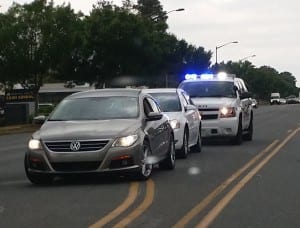GREENVILLE DUI ATTORNEY | ROBERT J. REEVES P.C.
ARRESTED FOR A GREENVILLE DUI? WE CAN HELP.
At the firm Robert J. Reeves P.C., we encourage all potential clients to review and compare the actual credentials of possible DUI lawyers. We even suggest that they personally meet with several firms to “get a feel” for the person. After you complete your research, you should then choose the law firm you trust most and the lawyer who puts you at ease. We know how serious a DUI charge is and do our very best for our clients. We would gladly sit down with you to discuss your particular situation. You can call us directly on our mobile phones during the day, in the evenings, on the weekends, and even holidays. We know getting answers now will help you sleep better tonight. Call us today.
CHOOSING A SOUTH CAROLINA DUI ATTORNEY
Many of our clients come to us feeling like they have already lost before they get started. Nothing could be farther from the truth. We begin every case with the understanding that arrest does NOT mean conviction. You come into this world innocent, and you go to court presumed innocent. That all important phrase has seemingly lost some impact, but it is what makes our judicial system unique in the world. The State of South Carolina has the entire burden of proof and must bring all evidence to convince a jury unanimously that you are guilty beyond a reasonable doubt. That’s a pretty high standard, and that’s what our experienced DUI attorneys do. We aggressively defend those persons arrested and charged with DUI and DUAC. We will tell you more about our lawyers shortly. Right now, let’s discuss how you got here.
DUI ARREST AND INVESTIGATION
Our clients are good, hard working individuals and this is often the first real trouble they’ve ever experienced. Suddenly, a night out with friends and dinner turns into an arrest and time in a jail cell with real criminals. They will never forget the experience. The loudness. The bad smell. The anxiety of being in a cage. All because they had a drink, a glass of wine, or a few beers. There was no accident. They did not injure anybody. Just driving home thinking about getting to bed. So what is the process? What can you expect? How did this happen? 
Most DUI investigations begin with suspicious driving, but not always. Sometimes, the traffic stop is for a different reason, totally unrelated to DUI. You might have forgotten to signal a turn, or you might be driving with an expired tag. Other times, police set up checkpoints for assorted reasons. Regardless of the purported purpose (license check, insurance check), the goal is always to find impaired drivers and make DUI arrests. If you “act suspiciously” (refusing to look at officer, too talkative, too quiet, chewing gum actively), you will draw the attention of the officer. However, when an officer smells alcohol, no matter how strong or faint, the stop immediately turns any stop into a full DUI investigation. Here’s what is supposed to happen next.
What Happens During a Stop?
If following the National Highway Traffic Safety Administration (NHTSA) Manual, the officer will first ask you a series of questions while you are still in the car or truck. You may also be asked to locate certain items, like your license or registration, while you are answering questions. These are “divided attention” exercises that require you to use different parts of your brain just like is required to safely operate a vehicle. If you do not perform these tasks well, the officer will then ask you to exit the vehicle. He or she will watch to see if you have difficulty getting out and whether you sway or even fall once you do. At this point, the DUI investigation is in full progress.
The next request will be for you to consent to attempting certain roadside or field sobriety tests. Different officers use different tests. However, there are three (3) standardized field sobriety tests NHTSA recognizes and approves. Any other tests are not deemed reliable and are not currently incorporated into the NHTSA Manual. If administered as required, the results are deemed validated and can be effectively used in court to argue impairment.
Standardized Roadside Tests
These standardized tests are to be performed a certain way and in a certain order. The proper testing order is (1) horizontal gaze nystagmus (HGN), followed by (2) walk and turn (WAT), and then (3) one leg stand (OLS). The officer must give specific instructions so as to insure any results are reliable. Each test is independent of the other, and officers are to proceed only if the suspect fails the preceding test. To “fail,” a person under investigation must show 4/6 cues HGN, 2/8 WAT, and 2/4 OLS. If the person is unable or refuses to perform any or all tests, there is some debate about whether an officer has sufficient probable cause to arrest. Of course, you can assume that debate will not end in your favor.
Many officers still employ other non-standardized tests, such as counting numbers, reciting parts of the alphabet, or balancing challenges. These tests are still allowed into evidence to further show perceived impairment, but only the standardized three are truly considered validated independently. DUI defense attorneys almost uniformly consider such “testing” to be inherently unreliable as few individuals can perform them under the best of circumstances. At this point, you are already handcuffed and placed under arrest. You are then transported to the police station for formal breath testing.
BREATH TESTING
When you arrive at the police station, you will go to a breath testing station. It’s usually just a small room with a table and chair along with a DataMaster “breathalyzer” machine. Police officers and prosecutors insist on calling this machine an “instrument.” I suppose calling it an “instrument” will somehow make this machine more “scientific” and perhaps more “reliable.” However, defense lawyers again are quite skeptical of any results as we have seen both high and low readings that did not reflect conduct observed on video. SC DUI laws require the officer to fully explain your implied consent rights and what options you have and any consequences for refusing to participate. This explanation is usually conducted during the twenty minute waiting period and while the machine is preparing for testing.
After everything is ready, you will be asked to “blow” into the mouthpiece “slow and steady” until told to stop. You will hear a beeping sound from the machine as it prepares to receive a breath sample. If you blow properly, the beeping will become a steady sound while your breath is taken into the equipment. If you refuse to give a sample or the machine is not operating properly while you are trying to blow, there will be immediate civil penalties in that your driving privileges will be suspended for six (6) months.
There are actually two aspects to a DUI arrest. First, there is the criminal charge which invokes certain Constitutional rights. Then, there is the civil side dealing with your privileges to drive. It gets a little confusing. Regardless of the actual BAC level, you will most probably still be charged with DUI, processed, and placed in a holding cell until you can appear in front of a judge for a bail hearing. That’s right. Even if your BAC level is below 0.08%, you will charged and booked. If below the “legal limit,” the State can still prosecute you based on the allegation that you were materially and appreciably impaired, and therefore, unsafe to drive.
PENALTIES
If convicted of a DUI 1st offense, you will pay a fine, complete Alcohol Drug Safety Action Program (ADSAP), SR-22 insurance for 3 years, and lose your driving privileges for 6 months. Depending on your BAC level, the fines can increase, and you might face jail time. And now, under the recent Emma’s law, even first time offenders can now be required to install ignition interlock devices in their vehicles for six months. As reflected in billboards around the State, a DUI can easily end up costing you over the next 3 years approximately $10,000.00. This is why it is so critical to consult with an experienced Greenville SC DUI lawyer to review your options and defenses. Being charged does NOT mean you are guilty. 
Attorney Robert J. Reeves is a seasoned trial lawyer with over 36 years experience in both civil and criminal courts. He is a member of the National Trial Lawyers Top 100, Super Lawyers, South Carolina Association of Criminal Defense Lawyers, and National College for DUI Defense. Mr. Reeves now applies his civil trial skills in handling complex injury cases to defending SC DUI cases in Greenville SC.
He has taken the same training as the police and has received certificates from the National Highway Transportation Safety Administration (NHTSA) in both DWI Investigation and Standardized Field Sobriety Testing as well as the Advanced Roadside Impaired Driving Enforcement (ARIDE) courses. Mr. Reeves makes himself personally available to both new and current clients. From his initial meeting and throughout the representation, he is evaluating how a jury might perceive you and what your best defense might be. You can reach Mr. Reeves directly at 803-554-4157 mobile or email
*Our firm is based in Fort Mill SC but represent DUI, DUAC, and BUI clients state-wide throughout South Carolina, including Greenville County. We would be honored to personally meet with you to see how we can help with your case. You’ll sleep better tonight knowing what to expect and how the process works. Call us today and let’s get started.
get help now.
(704) 351- 7979
after hours, evenings, or weekends
Contact Us:
Legal Help Videos
Check out our featured videos for some legal advice from our attorneys!
